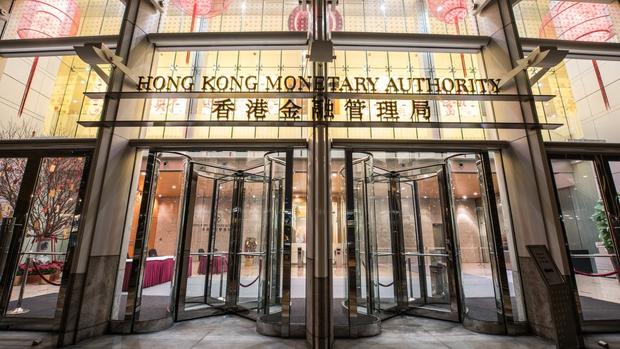 This undated photo shows the building of the Hong Kong Monetary Authority. (PHOTO / IC)
This undated photo shows the building of the Hong Kong Monetary Authority. (PHOTO / IC)
The Hong Kong Monetary Authority said its major priority this year will be continuing to monitor the credit risk of Hong Kong banks, as the general state of the global economy, the global interest-rate environment, the pandemic, and operating costs will adversely affect bank profitability.
The pre-tax operating profit of retail banks’ Hong Kong offices dropped18.6 percent last year, following the plunge of about 30 percent in 2020. The net interest margin of banks operating in the city dropped from 1.18 percent in 2020 to 0.98 percent last year, according to HKMA figures released on Wednesday.
According to the Hong Kong Monetary Authority, total loans of all authorized institutions in Hong Kong rose 3.8 percent in 2021, with total deposits jumping 4.6 percent in the same period. The Hong Kong dollar loan-to-deposit ratio stood at 86.7 percent last year
However, Arthur Yuen Kwok-hang, HKMA deputy chief executive, hinted that bank profitability in Hong Kong may improve this year.
“Hong Kong bank profitability this year will be affected by the interest rate trend in the United States. The US Federal Reserve says that it may take an aggressive approach toward the pace of interest rate hikes as the inflation level accelerates. If US interest rates increase, eventually interest rates in Hong Kong will rise because of the Linked Exchange Rate System. The room for a further squeeze in banks’ net interest margins is limited.”
ALSO READ: HKMA: No sign of significant outflows from banking system
But Yuen cautioned that, with the COVID-19 pandemic lingering on, supply-chain bottlenecks will hurt international trade activities, exerting financial pressure on some clients of banks operating in Hong Kong.
According to the HKMA, total loans of all authorized institutions in Hong Kong rose 3.8 percent in 2021, with total deposits jumping 4.6 percent in the same period. The Hong Kong dollar loan-to-deposit ratio stood at 86.7 percent last year.
As at September 2021, the classified loan ratio of all authorized institutions’ Hong Kong offices, overseas branches and major overseas subsidiaries stood at 0.81 percent.
“The exposure to high-leveraged property developers from the Hong Kong banking system actually is not significant, and there is no concentration with the exposure evenly distributed among different banks in Hong Kong. We do think that in terms of credit risks arising from those exposures, it should be manageable for the banking system,” Yuen said.
The International Monetary Fund said Hong Kong’s banking sector is resilient to liquidity stress, but added that monetary authorities should continue to strengthen systemic risk analysis of Chinese-mainland-related credit risks.
ALSO READ: HK regulator canvasses views on rules for crypto assets
“The authorities should also continue to ensure that the internal credit risk models used by Hong Kong banks to determine the capital charges for exposure to mainland borrowers, particularly those in the real estate sector with low credit ratings, are sufficiently forward-looking. Continued close monitoring of banks’ significant exposures to non-bank mainland entities and a periodic stress test of banks’ large exposure — on top of the regular stress testing — would also help,” the IMF said in its latest Hong Kong report, published on January 22.
Banks in Hong Kong are looking forward to 2022 with more optimism in terms of their financial performance as higher interest rates should improve margins, while non-interest revenue should also increase, as initiatives such as the Wealth Management Connect offer new growth opportunities, according to the KPMG Hong Kong Banking Outlook 2022 report, published on Tuesday.
Yuen has also been asked whether the stringent quarantine requirements of the Hong Kong government will damage Hong Kong’s reputation as an international banking center.
“There have been reports of people choosing not to come in, but we also have seen people coming in as well, despite this quarantine arrangement. I hope the pandemic situation will not last forever, and things will get back to normal. I hope the banking industry will view the issue with a long-term perspective,” Yuen said.
READ MORE: HKMA chief says Hong Kong resilient as global financial hub
US-based credit rating agency Moody’s Investors Service said Hong Kong’s banking system enjoys a strong macro profile because of ample liquidity in the market; the dominant deposit-funded nature and the low loan-to-deposit ratio of Hong Kong banks; the city’s large foreign exchange reserves, which limit the potential impact of potential fund outflows from Hong Kong banks; and the stable industry structure, with the top three banking groups maintain large market shares.


